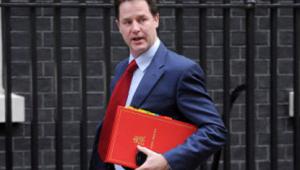15 October 2010
The £7bn earmarked by Deputy Prime Minister Nick Clegg to help disadvantaged children and young people from the age of 2 to 20 will not come out of the schools budget, the Cabinet Office has confirmed.
In his speech at a Derbyshire school today, Clegg emphasised the coalition’s commitment to fairness and announced a total of £7bn extra funds for a ‘fairness premium’.
He said that the current commitment of 15 hours a week of pre-school education given to disadvantaged three- and four-year-olds would be extended to two-year-olds at a cost of £300m a year by 2014/15.
He also provided more detail about the pupil premium, which gives schools funds for taking on disadvantaged pupils and was a central Liberal Democrat manifesto pledge. This will grow to an investment of £2.5bn a year, he added.
A further £150m a year would go towards ‘removing the obstacles’ that prevent ‘bright but poor’ children from entering university. ‘We will be consulting with universities and students on the most effective way of achieving that goal,’ he added.
The Cabinet Office confirmed to Public Finance that the £7bn will not affect the schools budget and that more detail will follow in next week’s Comprehensive Spending Review.
However, an Institute for Fiscal Studies analysis of the effects of the pupil premium investment showed that, although the policy is broadly progressive, it could increase school funding inequalities, with deprived schools in affluent areas benefiting more than their counterparts in deprived areas.
The government’s consultation document states that councils where funding per pupil is high – which tends to be in disadvantaged areas – would receive a smaller premium, because deprivation funding is ‘spread more thinly in less deprived areas’.
But Luke Sibieta, a senior research economist at the IFS, said: ‘That the pupil premium should be higher in less deprived areas is hard to justify: it would widen inequalities in funding for deprived pupils, rather than reduce them. Attaching the same pupil premium to all disadvantaged pupils regardless of where they live would not only be simpler, it would also be more consistent with the government’s stated objectives.’
The National Association of Schoolmasters/Union of Women Teachers said the funding boost was a ‘sop’ to the LibDems following Clegg’s support of the Browne Review of higher education. It warned that the funding would ‘sink without trace in the gaping hole in the education budget’.


















